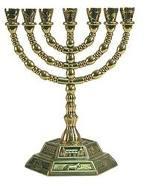

Rabbi's Sermon
And yes, there is another New Year!
No matter how we calculate the passage of time, whether we consider the first of January or the first of Tishrei (Rosh Hashanah) as the New Year, the beginning of a year is always a time to pause, to reflect, to contemplate.
Tishrei (Rosh Hashanah) represents a rededication of our
spiritual self. January is designed to give us a chance to think of our
relationships. Then there is Tu Bishvat, the New Year of the trees, and
Passover, the New Year of our birth as a nation and a people – our religious
maturity, if you will.
All can be summed up with a favorite quote from the
rabbis of Yavneh (a city in Israel that produced a Rabbinical Academy after
the destruction of the Temple in 70 AD): “I am a creation of God, and my
neighbor is also a creation of God; my work is in the city and his in the
field; I rise early to do my work and he rises early to do his. As he cannot
do well at my work; similarly, I cannot do well at his work.”
Nevertheless, if you say, "I do great things and he does unimportant things," perhaps we should respond: "We have learned that it does not matter if a person does much or little, but only if he directs his heart to heaven.”
Perhaps what the rabbis of Yavneh were trying to say is
that we need to care about each other, to be concerned about one another.
This is the essence of who we are – our character – our respect for the
dignity of all humans and animals as well.
All who toil in this vineyard of caring exemplify these teachings.
How do we accomplish this during
everyday living? Quite simply by being who we are – human beings created to
imitate the goodness of God. And each New Year
that is celebrated, secular or religious, gives us the opportunity to
rededicate ourselves to doing for others.
Yes, we have a New Year for trees because we know that
nature and humankind work together to make life livable and rewarding. Just
as the trees sleep in the winter and are reborn in the spring, we too can
garner our strength to bring renewal to our existence after the cold winter
has passed.
February also reminds us of our obligations to those in
need. This is why the Jewish Free Loan Associations throughout the world
were created. We are taught that maintaining a person’s dignity is paramount
in our relationships with one another. There is such an organization in
Phoenix – The Jewish Free Loan of Phoenix – and it has existed for quite
some time.
As a past president of this worthy effort, I saw
firsthand the needs and responses to those needs that gave a future and a
hope to so many. The mitzvah is not alone in the giving or in the lending,
but also in the way we respond to the need.
A tale is told about a person deep in prayer with a plea
to God to send someone to eradicate hunger and poverty and death and
destruction. He shouts to God to send someone to relieve the suffering. And
then there is a voice that whispers and says that someone was sent –